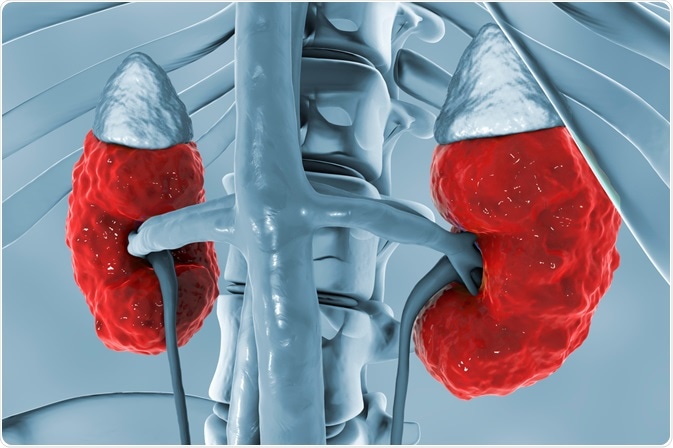For individuals that are diagnosed with chronic kidney disease (CKD), it can be difficult to accept the diagnosis and understand what it means for them. Although it is not possible to cure the disease or repair the damage already done to the kidneys, there are certain things that can help to stop the disease from progressing to become worse.

Image Credit: Kateryna Kon / Shutterstock
What to Expect
Most patients with CKD do not experience any symptoms related to the condition until it reaches a severe stage. Therefore, the quality of life is not reduced significantly and most patients can expect to continue partaking in normal daily activities without hindrance.
However, it is important that individuals with CKD are aware of the consequences if the disease progresses and make relevant changes to their diet and lifestyle to reflect this. In particular, patients are at risk of heart disease and complete kidney failure, where they rely on dialysis or a kidney transplant to survive.
Given the severity of this, patients should be encouraged to make every effort to maintain kidney function and reduce the risk of disease progression.
Patient's Story: Living with Chronic Kidney Disease
Lifestyle Advice
Firstly, there are several lifestyle factors that are linked to poorer outcomes for patients with chronic kidney disease. For example, smoking is linked to an increased risk of complications and, therefore, it is recommended to quit smoking if you currently smoke.
Likewise, being overweight or obese is also a risk factor for complications. Based on this knowledge, it is important to maintain a healthy weight by eating a nutritious diet and making sure to do enough exercise. As a general rule, at least 30 minutes of low- to moderate-intensity activity, such as walking or cycling is recommended each day.
Diet Advice
- Eat a varied diet with adequate fruit and vegetables
- Reduce cholesterol
- Restrict salt intake
Medical Advice
There are several medications that may be prescribed in the management of CKD. Many patients take regular medication to control blood pressure, blood glucose and cholesterol to reduce the risk of disease progression. In particular, angiotensin-converting enzyme (ACE) inhibitors and angiotensin receptor blockers are indicated for patients with CKD, as they appear to have a protective effect on kidney function.
It is important that patients take the medications as prescribed on a regular basis in order to get the most benefit.
Patients with chronic kidney disease should also inform all health professionals involved in their healthcare that they are affected by the CKD. This is because it can affect treatment decisions for other conditions and could have adverse effects if they are not aware of the specific circumstances. For example, other commonly used medications such as non-steroidal anti-inflammatory drugs (NSAIDs) can worsen kidney function.
Additionally, people with CKD are likely to benefit from an annual influenza vaccination, as well as a once-off pneumococcal pneumonia immunization.
Self-Care
It is important for patients living with chronic kidney disease to take control of their health and wellbeing. This includes being aware of things that they can do to improve the function of their kidneys and prevent disease progression and putting them into practice. Additionally, staying in tune with their body and monitoring for early signs of change is also important.
Having access to a strong support network is of utmost importance for individuals with a chronic condition such as CKD. This can help them to deal with the stress, pain and anxiety that can present with the disease and, in turn, help to improve their quality of life and life expectancy.
References
Last Updated: Feb 16, 2023